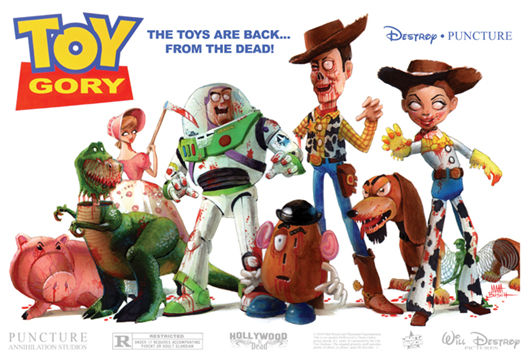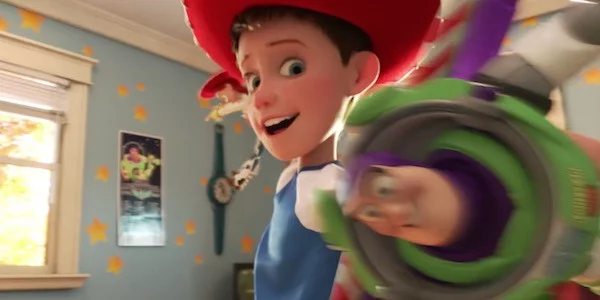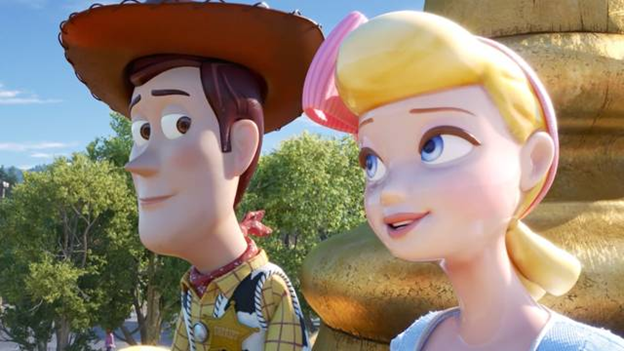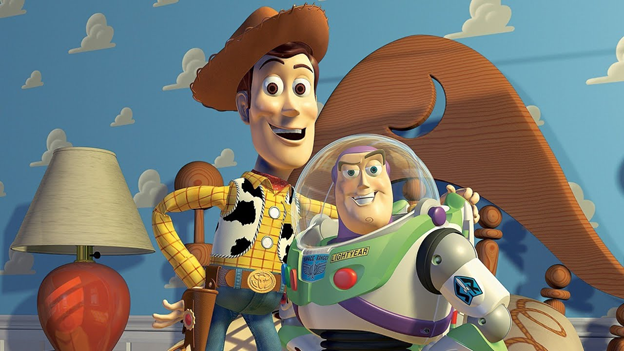Nine years ago, I said goodbye to TOY STORY. It was an end of an era. In college and about to enter my 20s, it felt like a good time to put away the toys from my childhood. I grew up and moved on. My whole generation did. We got jobs, graduated, paid taxes. Those magical, moving toys faded away like the glow of a dying ember, transforming into memories of simpler times.
Everyone thought TOY STORY 3 was the end. The fade to black, roll credits sunset on a beloved animated franchise. It was gone, done. So when the news broke that Pixar was going against their own promise, and resurrecting Woody and Buzz, it felt like a betrayal. A money grab, a move Disney has all but trademarked.
I didn’t want to see the zombified, empty shells of my favorite figures dancing to a hefty box office tune… but I was curious. What could these toys possibly have to say, nearly a decade later?

Credit to Matt Busch for making this euphemism a reality
A lot, apparently. TOY STORY 4 is a deep, insightful, existential probe into decidedly adult terrain. It’s metaphorical, it’s funny, and it feels like truly final farewell. A proper resolution and sendoff we never realized we needed.
That’s not to say TOY STORY 4 is perfect, but it’s everything I’d hoped it would be. The writers and filmmakers didn’t make this movie for children—they wrote it for us. The original fans, viewers in their late 20s and early 30s, longing to feel like a kid again. And, surprisingly, it appeals to grandparents and parents. Only Pixar could pull off a four-quadrant story about finding fulfillment and happiness in one’s twilight years, after one’s children grew up and moved on.
Cue airplane noise, as that one flies over kid’s heads.
Woody was always Andy’s toy. He grew up with him, present for every milestone. He watched Andy learn to ride a bike, accompanied him to kindergarten, and weathered vacations, moves, and more. But he’s not Andy’s toy anymore. He belongs to Bonnie, and… Bonnie doesn’t want to play with him.
So what does one do, when their journey and their life’s purpose is done?

Right about when I started sobbing
Woody’s kids don’t need him. He’s no longer the master of the room, no longer the boss or the seat of power. In a not so subtle nod to the rise of feminism, Woody’s female partner Jessie has been made the new sheriff. Effectively retired, Woody’s doomed to collect dust, stuffed away in a closet with other old toys.
Rather than accept his fate, Woody fights back, determined to remain useful. He refuses to believe Bonnie doesn’t need him. So when she literally creates a new toy, Forky, in kindergarten, Woody self-appoints as Forky’s guide, mentor, and protector.
Maybe I’m reading too much into the metaphor, but I thought Woody’s and Forky’s arc likened to that of a father and future son-in-law. Forky doesn’t want to be important to Bonnie. He literally keeps throwing himself into the trash, and does everything he can to run away from the little girl, even though it’s very apparent she loves him. But Woody sticks to him like glue, constantly fixing him up and pushing him back into her arms. It’s exhausting, but at the end of the day, he reasons, “it’s all for Bonnie.”
It’s strange to say, that Woody’s arc feels both in-character and also very complicated. The question of his happiness looms large, as we swing from moments with Bo to numerous rescue attempts to reunite Forky and Bonnie. Woody sacrifices so much throughout the story—his time, his sanity, and eventually, his voice. It’s all to give other toys a chance to be loved, to feel what it’s like to matter… an act that is beautiful and selfless.
But Woody’s always been a selfish character, in my opinion. He’s hostile to Buzz because he doesn’t want to share Andy’s love. He places his kids above everything and everyone else. Most of his altruism comes from a self-serving place. So while this change of heart seems like growth—like a complete arc—it doesn’t feel completely authentic to Woody.
Eventually his “selfless” efforts pay off. Forky begins to realize his role, and becomes more confident and assured. He commits to Bonnie, and then… Woody has nothing left. Like a ship adrift at sea, he knows the moment he returns Forky to Bonnie is the moment he’s officially and absolutely obsolete.
Enter Bo Peep, Woody’s paramour back in the day.

Woody’s old love, Bo Peep, calling him home. Or to the afterlife, if you read into it
TOY STORY 4 isn’t shy about reinforcing the modernist trope that girls are strong, but guns blaze especially strong when it comes to Bo Peep. Always meek and reserved, Bo’s gotten a massive rework, transforming into a toy that doesn’t need anyone—let alone the man she once loved. She’s brave, brazen, and unfazed. Snap her arm off, and she’ll just tape it back on.
Woody and Bo’s story leans hard into the “toys in twilight years” theme I mentioned earlier. They’re literally two exes, who have both lost their children, looking to reconnect as different people with a lot of baggage and a lot of history. Bo’s been with other men, whereas Woody only had eyes for her. Bo wears pants, takes charge, and tosses aside her femininity… and that’s something Woody has to accept and come to terms with.
Not to mention she’s constantly singing a siren song, enticing Woody away from his misplaced allegiance to Bonnie. “Let it all go,” she tells him, and encourages him to join her as she travels with a carnival. It’s a nebulous future of freedom, of journey and exploration. A future where he’s not tied down by duty or friends or family.
A future without Buzz, his best friend.
You see, the biggest gripe I had with TOY STORY 4 is that they chose to separate Woody and Buzz, presumably forever. TOY STORY isn’t TOY STORY without the iconic duo.

In memoriam
Sure, Buzz is newer, cooler, and duty-bound. His story and future definitely conflicts with where Woody’s ultimately led. But we barely spend time with Buzz in 4. He’s always chasing Woody’s ghost—both metaphorically and literally. So when they finally say goodbye, after nearly three decades, it feels final. More final than TOY STORY 3 ever could have been. Death thee do part.
And in that sense, TOY STORY 4 is extremely adult and sad.
Which isn’t to say the movie isn’t funny. It’s full of laughs, probably the most riotously humorous of Pixar’s slate. It balances the bittersweet with giggles, the comedy with the tragedy. I laughed out loud during the majority of the movie, but that didn’t stop the tears when Woody parts with his crew, walking off with his blonde bombshell into the unknown.
I never thought existential dread could make for a compelling, fun family movie… but Pixar, you’ve proved me wrong. TOY STORY 4 is worth dusting off the toybox again. Nostalgia, angst, laughter, and heartache blend perfectly into something that’s a little less kid-friendly—but honestly I’m okay with that. Childlike wonder be damned.
All I know is, “You’ve Got A Friend In Me” will never be the same.















Comments